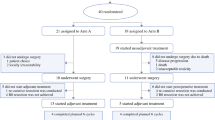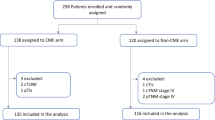Abstract
Background
Cytoreductive surgery and hyperthermic intraperitoneal chemotherapy (CRS-HIPEC) results in significant morbidity and readmissions. Previous studies have been limited by single-institution design or lack of tumor details in the database used.
Methods
The 12-institution US HIPEC Collaborative Database was queried between 1999 and 2017. Preoperative and intraoperative patient and tumor details were analyzed for associations with readmissions.
Results
A total of 2017 of 2372 cases were included in the analysis. The 30-day readmission rate was 15.9% (n = 321). Common indications for readmission included failure to thrive (29.9%), infection (23.6%), and ileus/bowel obstruction (15.1%). The readmitted cohort had more complications, including intra-abdominal abscess (21.2% vs 6.2%), ileus (28.0% vs 17.2%), anastomotic leak (11.2% vs 2.2%), enteric fistula (5.6% vs 1.5%), deep venous thrombosis (6.2% vs 2.5%), and pulmonary embolism (6.9% vs 2.5%). Factors independently associated with readmission (p < 0.05) included ECOG score ≥ 3 (OR 3.4), depression (OR 2.4), total parenteral nutrition (OR 3.6), low anterior resection or partial colectomy (OR 2.0), and stoma creation (OR 2.2). Factors not associated included neoadjuvant chemotherapy, peritoneal cancer index, and completeness of cytoreduction. Readmission rate between 31 and 90 days was 3.9% (n = 78). Independent predictors (p < 0.05) included operative time (OR 1.1), low anterior resection or partial colectomy (OR 1.7), and stoma creation (OR 2.2).
Conclusions
In the largest study to date examining readmissions after CRS-HIPEC, 30-day readmission rate was 15.9%. Tumor factors failed to predict readmission, whereas preoperative functional status and depression along with individual cytoreductive procedures predicted readmission. Patients with these risk factors or postoperative complications may benefit from closer post-discharge monitoring.




Similar content being viewed by others
References
Glehen O, Mohamed F, Gilly FN. Peritoneal carcinomatosis from digestive tract cancer: new management by cytoreductive surgery and intraperitoneal chemohyperthermia. Lancet Oncol 2004;5(4):219-228.
Chua TC, Moran BJ, Sugarbaker PH, et al. Early- and long-term outcome data of patients with pseudomyxoma peritonei from appendiceal origin treated by a strategy of cytoreductive surgery and hyperthermic intraperitoneal chemotherapy. J Clin Oncol 2012;30(20):2449-2456.
Elias D, Gilly F, Boutitie F, et al. Peritoneal colorectal carcinomatosis treated with surgery and perioperative intraperitoneal chemotherapy: retrospective analysis of 523 patients from a multicentric French study. J Clin Oncol 2010;28(1):63-68.
Levine EA, Stewart JHt, Shen P, Russell GB, Loggie BL, Votanopoulos KI. Intraperitoneal chemotherapy for peritoneal surface malignancy: experience with 1,000 patients. J Am Coll Surg 2014;218(4):573-585.
van Driel WJ, Koole SN, Sikorska K, et al. Hyperthermic Intraperitoneal Chemotherapy in Ovarian Cancer. N Engl J Med 2018;378(3):230-240.
Verwaal VJ, Bruin S, Boot H, van Slooten G, van Tinteren H. 8-year follow-up of randomized trial: cytoreduction and hyperthermic intraperitoneal chemotherapy versus systemic chemotherapy in patients with peritoneal carcinomatosis of colorectal cancer. Ann Surg Oncol 2008;15(9):2426-2432.
Schneider MA, Eshmuminov D, Lehmann K. Major Postoperative Complications Are a Risk Factor for Impaired Survival after CRS/HIPEC. Ann Surg Oncol 2017;24(8):2224-2232.
Baumgartner JM, Kwong TG, Ma GL, Messer K, Kelly KJ, Lowy AM. A Novel Tool for Predicting Major Complications After Cytoreductive Surgery with Hyperthermic Intraperitoneal Chemotherapy. Ann Surg Oncol 2016;23(5):1609-1617.
Simkens GA, van Oudheusden TR, Luyer MD, et al. Predictors of Severe Morbidity After Cytoreductive Surgery and Hyperthermic Intraperitoneal Chemotherapy for Patients With Colorectal Peritoneal Carcinomatosis. Ann Surg Oncol 2016;23(3):833-841.
Bartlett EK, Meise C, Roses RE, Fraker DL, Kelz RR, Karakousis GC. Morbidity and mortality of cytoreduction with intraperitoneal chemotherapy: outcomes from the ACS NSQIP database. Ann Surg Oncol 2014;21(5):1494-1500.
Lee L, Alie-Cusson F, Dube P, Sideris L. Postoperative complications affect long-term outcomes after cytoreductive surgery and hyperthermic intraperitoneal chemotherapy for colorectal peritoneal carcinomatosis. J Surg Oncol 2017;116(2):236-243.
Chua TC, Yan TD, Saxena A, Morris DL. Should the treatment of peritoneal carcinomatosis by cytoreductive surgery and hyperthermic intraperitoneal chemotherapy still be regarded as a highly morbid procedure?: a systematic review of morbidity and mortality. Ann Surg 2009;249(6):900-907.
Martin AS, Abbott DE, Hanseman D, et al. Factors Associated with Readmission After Cytoreductive Surgery and Hyperthermic Intraperitoneal Chemotherapy for Peritoneal Carcinomatosis. Ann Surg Oncol 2016;23(6):1941-1947.
Dreznik Y, Hoffman A, Hamburger T, et al. Hospital readmission rates and risk factors for readmission following cytoreductive surgery (CRS) and hyperthermic intraperitoneal chemotherapy (HIPEC) for peritoneal surface malignancies. Surgeon 2018;16(5):278-282.
Cripe J, Tseng J, Eskander R, Fader AN, Tanner E, Bristow R. Cytoreductive surgery and hyperthermic intraperitoneal chemotherapy for recurrent ovarian carcinoma: analysis of 30-day morbidity and mortality. Ann Surg Oncol 2015;22(2):655-661.
Paredes AZ, Abdel-Misih S, Schmidt C, Dillhoff ME, Pawlik TM, Cloyd JM. Predictors of Readmission After Cytoreductive Surgery and Hyperthermic Intraperitoneal Chemotherapy. J Surg Res 2019;234:103-109.
Jafari MD, Halabi WJ, Stamos MJ, et al. Surgical outcomes of hyperthermic intraperitoneal chemotherapy: analysis of the american college of surgeons national surgical quality improvement program. JAMA Surg 2014;149(2):170-175.
Low CA, Bovbjerg DH, Ahrendt S, et al. Depressive Symptoms in Patients Scheduled for Hyperthermic Intraperitoneal Chemotherapy With Cytoreductive Surgery: Prospective Associations With Morbidity and Mortality. J Clin Oncol 2016;34(11):1217-1222.
Gagniere J, Veziant J, Pereira B, Pezet D, Le Roy B, Slim K. Cytoreductive Surgery and Hyperthermic Intraperitoneal Chemotherapy for the Elderly: Is It Reasonable? A Meta-Analysis Ann Surg Oncol 2018;25(3):709-719.
Jacobsen PB, Andrykowski MA. Tertiary prevention in cancer care: understanding and addressing the psychological dimensions of cancer during the active treatment period. Am Psychol 2015;70(2):134-145.
Mitchell AJ, Chan M, Bhatti H, et al. Prevalence of depression, anxiety, and adjustment disorder in oncological, haematological, and palliative-care settings: a meta-analysis of 94 interview-based studies. Lancet Oncol 2011;12(2):160-174.
Kelly KJ, Cajas L, Baumgartner JM, Lowy AM. Factors Associated with 60-Day Readmission Following Cytoreduction and Hyperthermic Intraperitoneal Chemotherapy. Ann Surg Oncol 2018;25(1):91-97.
Dineen SP, Robinson KA, Roland CL, et al. Feeding tube placement during cytoreductive surgery and heated intraperitoneal chemotherapy does not improve postoperative nutrition and is associated with longer length of stay and higher readmission rates. J Surg Res 2016;200(1):158-163.
Jimenez W, Sardi A, Nieroda C, et al. Predictive and prognostic survival factors in peritoneal carcinomatosis from appendiceal cancer after cytoreductive surgery with hyperthermic intraperitoneal chemotherapy. Ann Surg Oncol 2014;21(13):4218-4225.
Faron M, Macovei R, Goere D, Honore C, Benhaim L, Elias D. Linear Relationship of Peritoneal Cancer Index and Survival in Patients with Peritoneal Metastases from Colorectal Cancer. Ann Surg Oncol 2016;23(1):114-119.
Spiliotis J, Halkia EE, Kalantzi N, et al. Mapping the location of peritoneal metastases using the peritoneal cancer index and the correlation with overall survival: a retrospective study. J BUON 2015;20 Suppl 1:S64-70.
Ihemelandu C, Fernandez S, Sugarbaker PH. A Prognostic Model for Predicting Overall Survival in Patients with Peritoneal Surface Malignancy of an Appendiceal Origin Treated with Cytoreductive Surgery and Hyperthermic Intraperitoneal Chemotherapy. Ann Surg Oncol 2017;24(8):2266-2272.
Symer MM, Abelson JS, Milsom J, McClure B, Yeo HL. A Mobile Health Application to Track Patients After Gastrointestinal Surgery: Results from a Pilot Study. J Gastrointest Surg 2017;21(9):1500-1505.
Cleeland CS, Wang XS, Shi Q, et al. Automated symptom alerts reduce postoperative symptom severity after cancer surgery: a randomized controlled clinical trial. J Clin Oncol 2011;29(8):994-1000.
Bednarski BK, Slack RS, Katz M, et al. Assessment of Ileostomy Output Using Telemedicine: A Feasibility Trial. Dis Colon Rectum 2018;61(1):77-83.
Author information
Authors and Affiliations
Contributions
All persons who meet authorship criteria are listed as authors, and all authors certify that they have participated sufficiently in the work to take public responsibility for the content, including participation in the concept, design, analysis, writing, or revision of the manuscript and approving the final version of the manuscript. Furthermore, each author certifies that this material or similar material has not been and will not be submitted to or published in any other publication before its appearance in the Journal of Gastrointestinal Surgery.
Tiffany C. Lee: Conception and design of study, acquisition of data, analysis and interpretation of data, drafting of manuscript, revision and final approval of manuscript
Koffi Wima: Analysis and interpretation of data, revision, and final approval of manuscript
Jeffrey J. Sussman, Syed A. Ahmad, Jordan M. Cloyd, Ahmed Ahmed, Keith Fournier, Andrew Lee, Sean Dineen, Benjamin Powers, Jula Veerapong, Joel M. Baumgartner, Callisia Clarke, Harveshp Mogal, Charles A. Staley, Shishir K. Maithel, Jennifer Leiting, Travis Grotz, Laura Lambert, Ryan J. Hendrix, Sharon M. Weber, Courtney Pokrzywa, Andrew M. Blakely, Byrne Lee, Fabian M. Johnston, Jonathan Greer, Sameer H. Patel: Conception and design of study, acquisition of data, analysis and interpretation, revision, and final approval of manuscript
Corresponding author
Ethics declarations
Conflict of Interest
The authors declare that they have no conflict of interest.
Additional information
Publisher’s Note
Springer Nature remains neutral with regard to jurisdictional claims in published maps and institutional affiliations.
Rights and permissions
About this article
Cite this article
Lee, T.C., Wima, K., Sussman, J.J. et al. Readmissions After Cytoreductive Surgery and Hyperthermic Intraperitoneal Chemotherapy: a US HIPEC Collaborative Study. J Gastrointest Surg 24, 165–176 (2020). https://doi.org/10.1007/s11605-019-04463-y
Received:
Accepted:
Published:
Issue Date:
DOI: https://doi.org/10.1007/s11605-019-04463-y




